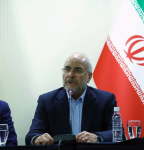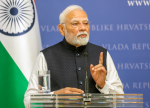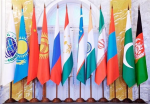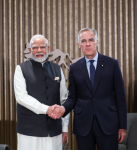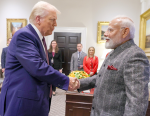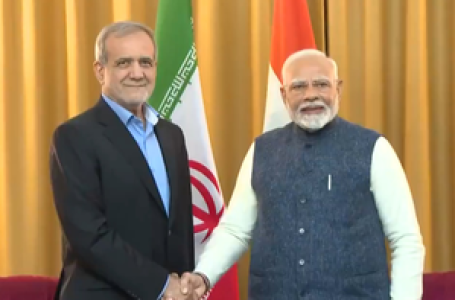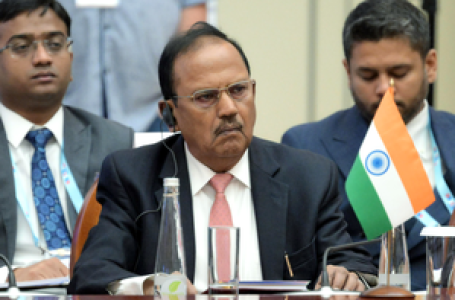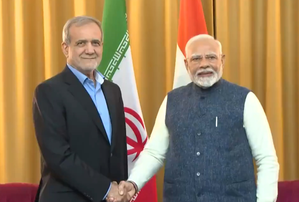
New Delhi: Just 12 days after hostilities erupted in West Asia, with Israel abruptly opting to attack Iran’s nuclear facilities and remove its top leadership, the cross-fire has ceased, equally abruptly, with US President Donald Trump again playing peacemaker. Shortly after his announcement of a cease-fire, on social media, both Iran and Israel appeared to have accepted the cessation of hostilities, much like India and Pakistan did six weeks ago.
The circumstances are strange, as Trump himself joined in the attacks, announcing barely 48 hours ago that US bombers had struck three of Iran’s primary nuclear sites and decimated them, and threatening massive retaliation if Iran attacked US assets. Last night, Iran attacked a US base in Qatar, albeit with prior notice and reportedly no casualties, while Bahrain, where the US 5th fleet has a base, closed off its air space. But Trump responded by announcing that both Iran and Israel had accepted a “respectful” cease-fire.
It is unclear what has transpired to arrive at this outcome, however welcome, and exactly how long the cease-fire may hold. Tehran’s threat to restrict traffic through the Straits of Hormuz could have played a part. However, having said it would be the party to call an end to hostilities, Iran has breached the cease-fire, leaving open the prospect of an Israeli retaliation.
Even if, as Trump has announced, the hostilities are placed on hold, what is unclear is what these air strikes raining missiles and drone attacks causing panic, and some havoc, actually achieved.
If the purpose was to take out Iran’s nuclear bomb-making capability, it is extremely unlikely Tehran will stop its efforts. On the contrary, it is likely to opt out of the Nuclear Non-Proliferation Treaty (NPT), restricting efforts by the International Atomic Energy Agency (IAEA) to monitor its nuclear programme and stop the bomb.
According to analysts, it is unlikely that crippling damage has been inflicted on Iran’s nuclear enrichment sites, at Natanz, Fordow, Arak and Isfahan, although the strikes and killing of top nuclear scientists will have set the Iranian nuclear project back. Estimates suggest that Iran already possesses around 400kg of highly enriched (60%) bomb-grade uranium and there will be little incentive for them to hold back on crossing the rubicon. The direct attack on their nuclear facilities, by both Israel and the US, has provided them the strategic and even moral sanction to break their restraints. The possibility of a regime change in Iran, under threat, appears even less likely.
In all this, India, which aims to be a global voice of authority in a multi-polar world, and has major stakes in ensuring a cessation of hostilities, given that its energy supplies are largely dependent of the West Asian region, where it also has a vast diaspora, has chosen to remain silent.
Prime Minister Narendra Modi again reiterated, this time in Croatia, that this was not an era of war. However, beyond expressing “deep concern” and asking the Iranian President Masoud Pezeshkian, in a telephonic conversation, for “immediate de-escalation” of hostilities, he has neither condemned the US strikes on Iran’s nuclear facilities nor has he asked his close friend Israeli Premier Benjamin Netanyahu to cease the attacks on Iran, which launched the possibility of engulfing the entire region in a conflagration with disastrous consequences across the globe.
Congress party leader Sonia Gandhi in fact, held up a mirror to the government in an op-ed for The Hindu newspaper. Questioning what she called the government’s “silence on the devastation in Gaza and the hostilities against Iran,” Gandhi said the silence was “a disturbing departure” from India’s traditional moral diplomatic stance and “represents not just a loss of voice but also a surrender of values.”
Condemning Israel for its “deeply troubling and unlawful strike against Iran and its sovereignty,” Gandhi said, “As with so many of Israel’s recent actions, including its brutal and disproportionate campaign in Gaza, this operation was executed with utter disregard for civilian lives and regional stability. These actions will only deepen instability and sow the seeds of further conflict.”
India depends on imports for over 80% of its energy requirements. Despite diversifying imports from beyond West Asia and despite its oil marketing companies having several weeks of crude supplies, a drastic rise in prices of crude and gas could create havoc with the economy, which is already strain from the recent India-Pakistan hostilities and the long lasting Russia-Ukraine war.
New Delhi is caught in a bind. There are close to eight million Indian diaspora in the region. India has successfully evacuated over 1700 of its citizens so far from the conflict afflicted zones. The Indian government has close defence, strategic and even ideological ties with the Israeli government, which has emerged as a staunch supporter, most recently witnessed during the India – Pakistan hostilities last month. With Iran, the ties are more civilizational and geo-economic. While India depends less now on energy supplies from Iran, its larger trade, transport and connectivity issues, including the INSTC (International North South Transport Corridor), the IMEC (India-Middle East Europe Economic Corridor) and, more recently, the Chabahar port are closely intertwined with Iran.
How the situation in West Asia continues to evolve, as Trump threatens both Iran and Israel for continuing cease-fire violations and how India navigates this situation remains to be seen. However, what this conflict has amply demonstrated is the emasculation of Russia, which is so embroiled in its quagmire in Ukraine that it has been unable to come to the support of a close ally which even supplied it drones in that conflict. This will likely lead to significant changes in the global geo-strategic landscape.
INDIA NEWS STREAM



 by Nilova Roy Chaudhury
by Nilova Roy Chaudhury


